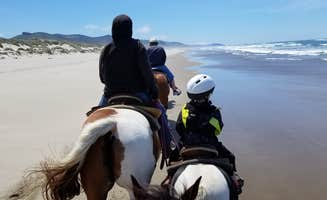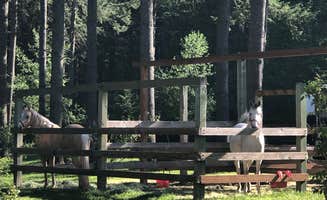Willamette Mission State Park Horse Camp provides equestrians access to extensive trails through varied terrain. The campground sits on land that experiences seasonal flooding during winter months, restricting camping season from May 15 to September 30. Trail riders can explore diverse landscapes including the largest Black Cottonwood tree in Oregon. Water access is limited, requiring campers to bring water for themselves and their horses or filter from the Willamette River.
What to do
Trail riding adventures: Equestrians seeking additional horse campgrounds near Willamina, Oregon can venture to Silver Falls State Park Campground for scenic riding options. "Short drive or hike to the falls," notes Richard H., who adds that "roads and campsites are paved and level," making it convenient for horse trailers to navigate.
Beach riding excursions: The Oregon coast offers unique horseback riding opportunities at Nehalem Bay State Park Campground where riders frequently take their horses onto coastal terrain. Jamie B. mentions it's a "super neat experience" with "always horses riding on the beach too," providing a different experience from Willamette Valley riding.
River access points: Cool off your horses at multiple water spots along trails at Jones Creek in Tillamook State Forest. Katie C. reports: "There are many river access points, the forestry center, walking trails and wildlife all within walking distance," offering additional options beyond Willamette Mission's river frontage.
What campers like
Spacious, level sites: Equestrian campers appreciate sites designed to accommodate their needs. At Beverly Beach State Park Campground, Kristen W. notes: "Many if not most of the campsites are nestled between large trees, which gives them some privacy." This arrangement provides a natural buffer between horses and other camping activities.
Dedicated trail systems: Beyond Willamette Mission, experienced equestrians recommend exploring Mt. Hebo Horse Trail in the Siuslaw National Forest. Though Jonathan U. warns about conditions: "If it was clean would have been a great site. Has nice roads, and camp fire pit. Lots of room and flat ground," highlighting the importance of checking trail maintenance before traveling with horses.
Educational opportunities: Trail riding often connects with historical or natural points of interest. At Willamette Mission, the Black Cottonwood is just one feature. Kelly N. explains that at the park "a lot of work has been done to keep this site up for public education and trails - we take elementary students to this site every spring to have a field science day," adding educational value to equestrian outings.
What you should know
Seasonal accessibility: Unlike Willamette Mission's May-September season, some equestrian camping areas offer extended access. Polk County Fairgrounds provides year-round camping with Casey P. noting it offers "location + affordability" with "a huge gravel lot with RV hookups" that can accommodate horse trailers during off-seasons.
Trail conditions: During wetter months, trails become challenging for horses. Jessica M. clarifies about Willamette Mission: "Only sites for camping with horses," ensuring riders understand the specialized nature of the facility before arrival.
Fire restrictions: Many horse camps have specific fire regulations that differ from standard campgrounds. At Mt. Hebo Horse Trail sites, fires may not be permitted during dry seasons. Campers should check current fire regulations before planning cookouts or evening campfires, as restrictions change seasonally based on conditions.
Wildlife awareness: Horses can startle easily when encountering wildlife. Be aware that mosquitoes are common near water sources at dusk, and larger wildlife including deer may appear suddenly on trails. Prepare your horses for potential wildlife encounters before riding unfamiliar trails.
Tips for camping with families
Kid-friendly equestrian activities: When camping with children and horses, seek grounds with dedicated youth programs. L.L. Stub Stewart Memorial State Park provides family-oriented experiences with Shane B. reporting: "Aside from the sites, the park has many hiking trails of varying length, access to the Banks-Vernonia State Trail, several disc golf courses, cabins, a horse camp, a day use picnic/event area."
Water safety training: Children should understand rules around horses and water. At Jones Creek, Amanda B. found "a lovely spot away from the busy campground below" that was "peaceful and relaxing," offering safer areas for children to observe horses cooling off in water.
Educational programming: Some equestrian campgrounds offer structured learning opportunities. At Silver Falls State Park, ranger programs introduce children to wilderness skills and horse care basics. These programs typically run on summer weekends and require advance registration.
Tips from RVers
Horse trailer parking: RVers with horse trailers need specific accommodations. David M. found at Polk County Fairgrounds that "$25 per night a good nightly rate. So much better than those CGs next to highways and RRs," offering quieter surroundings for horses sensitive to traffic noise.
Electric hookups for horse campers: RVers traveling with horses often need electricity for various equipment. Theresa R. notes at Polk County Fairgrounds: "Electricity 30 amp and water at the post. Dump station nearby. We were visiting relatives in this area, so really only need a safe place to park the rig."
Accessibility considerations: When traveling with horses and RVs, route planning is essential. Choose campgrounds with wide, well-maintained access roads and adequate turning radius for large rigs with horse trailers. Call ahead to confirm current road conditions, especially after periods of heavy rain.



